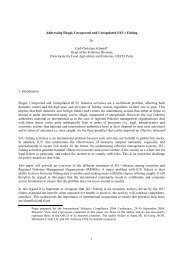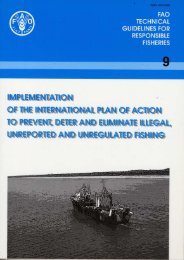Stop Illegal Fishing Case Study Series 7 - International MCS Network
Stop Illegal Fishing Case Study Series 7 - International MCS Network
Stop Illegal Fishing Case Study Series 7 - International MCS Network
You also want an ePaper? Increase the reach of your titles
YUMPU automatically turns print PDFs into web optimized ePapers that Google loves.
Lessons learned• Providing intelligence analysis and regularinformation to countries within a supportframework such as FISH-i Africa can resultin national actions against illegal operatorsthat place a nancial burden on operatorsmaking illegal shing less protable.• Engaging the legitimate industry and marketStates provides an opportunity for supportand further pressure on illegal operators thatforces ag States to full their obligationsin respect of the vessels entitled to y theirags.• Legal frameworks require furtherstrengthening through the inclusion ofa Lacey Act type provision into nationalsheries legislation to enable States toconduct sheries law enforcement actions(including initiate administrative or judicialproceedings) for breach of laws andregulations having taken place under anotherState’s jurisdiction; and to develop regionalsheries instruments to strengthen regionalcooperation in sheries law enforcement.• Global information and intelligenceexchange and cooperation is required asvessels move from one ocean to another andsh is transported and traded internationally.• Timely publishing of the case in the mediahelps to send a message to other IUU shingoperators, to encourage action by the agStates and to gain international and popularsupport for the case.Key features and outcomes• Effective pan-African cooperation – demonstratedthat no matter where the Premier went, it was heldresponsible for its illegal shing actions.• Payment of two million US dollars settlementto Liberia – demonstrated that when the costof illegal shing becomes too high, owners areforced to play by the rules.• On-going media coverage and press releases– placed on the <strong>Stop</strong> <strong>Illegal</strong> <strong>Fishing</strong> and BNFwebsites 3 including countering false accusationsmade against Liberia generated global support.• The UK and other EU States imposed extrainspections and restrictions on tuna imports fromWest Africa – based on increased evidence andexposure of IUU shing activities.• Legitimate industry did not want any real orperceived connection to Dongwon – this helpedto stop the ofoading of Premier’s catch in PortLouis, while in Thailand buyers were reported to beavoiding Dongwon sh for the European market.• South Korea amended its Fisheries law tostrengthen penalties against its distant watervessels that sh illegally – due to the harmfulmedia coverage of Dongwon and a recentwarning from the United States for a possibleimport ban on South Korea’s sheries products.• Application of the regional legal framework – thestrict IOTC PSMR, based on the FAO Port StateMeasures Agreement (PSMA) provided the legalframework for actions that were taken.• Strengthening FISH-i Africa – the critical rolethat the FISH-i Africa Task Force played in thePremier case, drew awareness to the benets ofexpanding this group and in May 2013 Mauritiusand Madagascar joined the Task Force.Challenges• Limited human capacity within <strong>MCS</strong> agencies– if the enforcement ofcers with adequateknowledge, experience and understanding wereunavailable, delays in decision making occurred.• Communication and exchange between Liberiaand FISH-i Africa countries – were at times testingas this was a pioneer exercise with no establishedprocedures or protocols.• Lack of internationally coordinated police effortto investigate corruption and fraud issues – thevessel was denied access to port and charged withillegal shing, but the forgery of licenses and otherState communications were not fully investigated.• Unclear legal framework with regard to dealingwith vessels with an IUU shing history –presented challenges for interpretation anddecision-making.Players involved• Liberian Bureau of National Fisheries andMinistry of Agriculture: initiated legalproceedings against the Premier and prosecuted itfor illegal shing activities in Liberian waters withthe support of the West Africa Regional FisheriesProject.• <strong>Stop</strong> <strong>Illegal</strong> <strong>Fishing</strong>: a working group of theNEPAD that provides facilitation and advice to allAfrican countries including the FISH-i Africa TaskForce with respect to illegal shing.• Analytical Unit of the Trygg Mat Foundation:identied the illegal shing activities by thePremier in the Liberian EEZ, tracked the Premier’smovements throughout this case keeping countriesone step ahead of the vessel.• Coastal States of FISH-i Africa: Comoros, Kenya,Madagascar, Mauritius, Mozambique, Seychellesand the United Republic of Tanzania sharedinformation and collectively denied licensing,
















